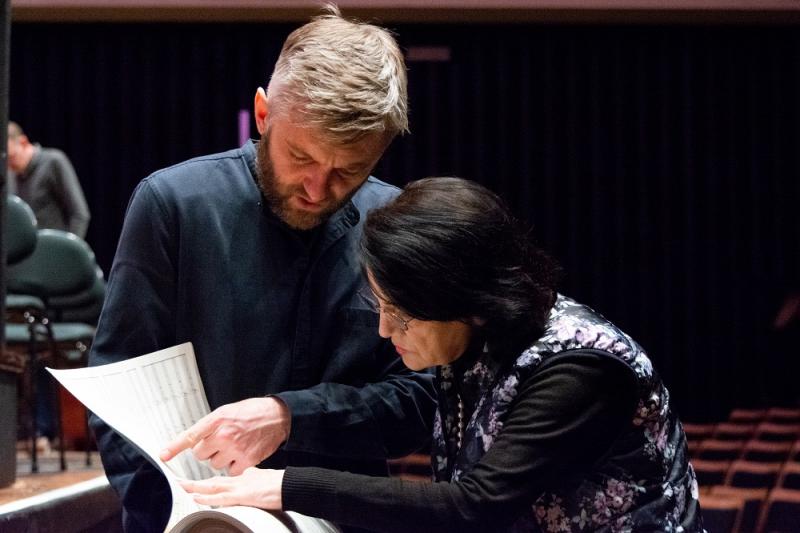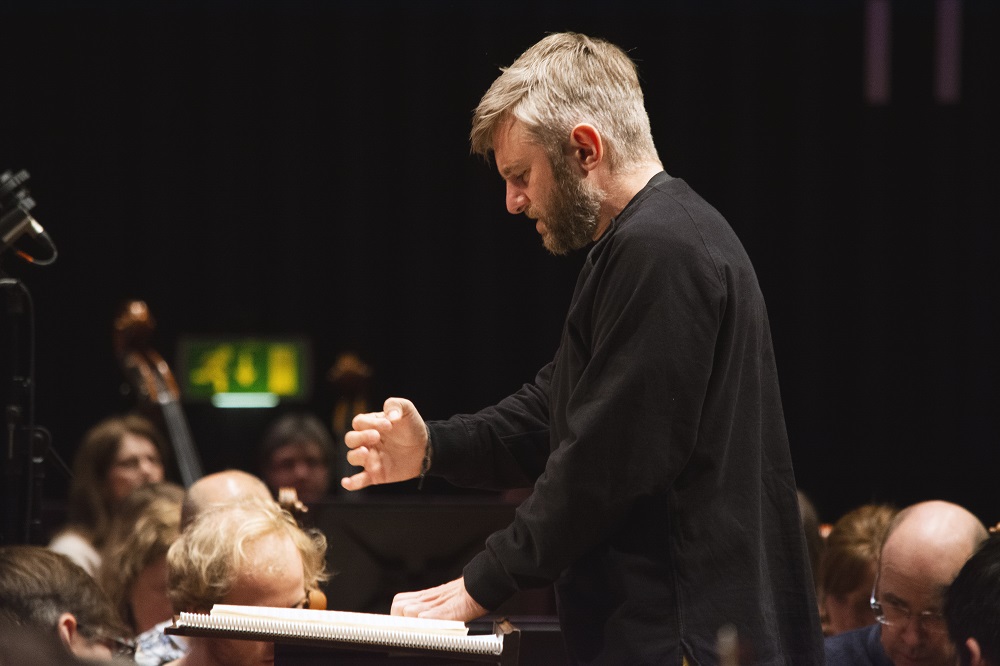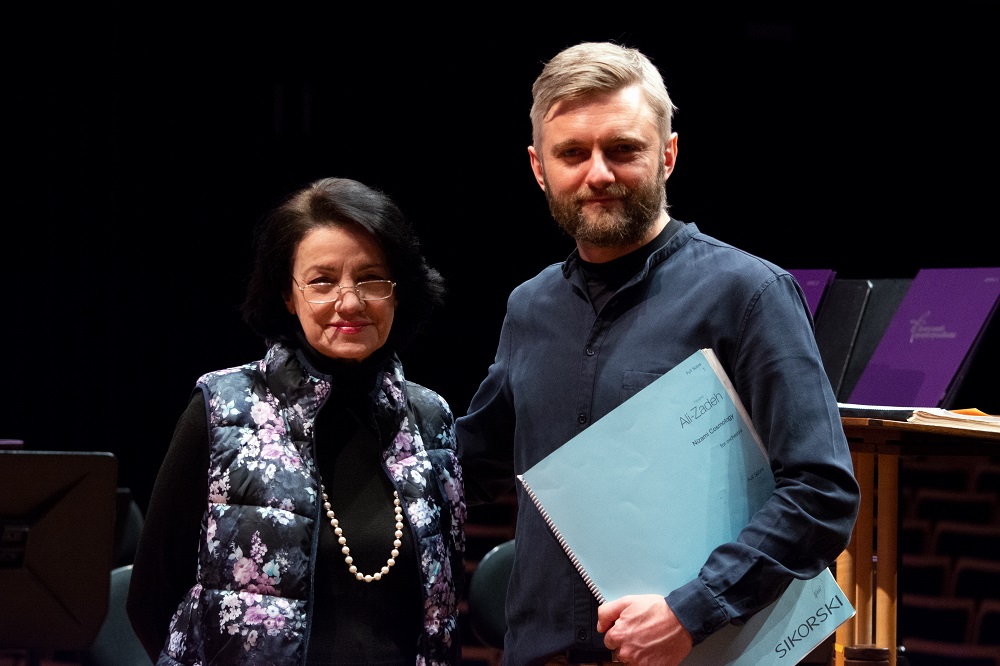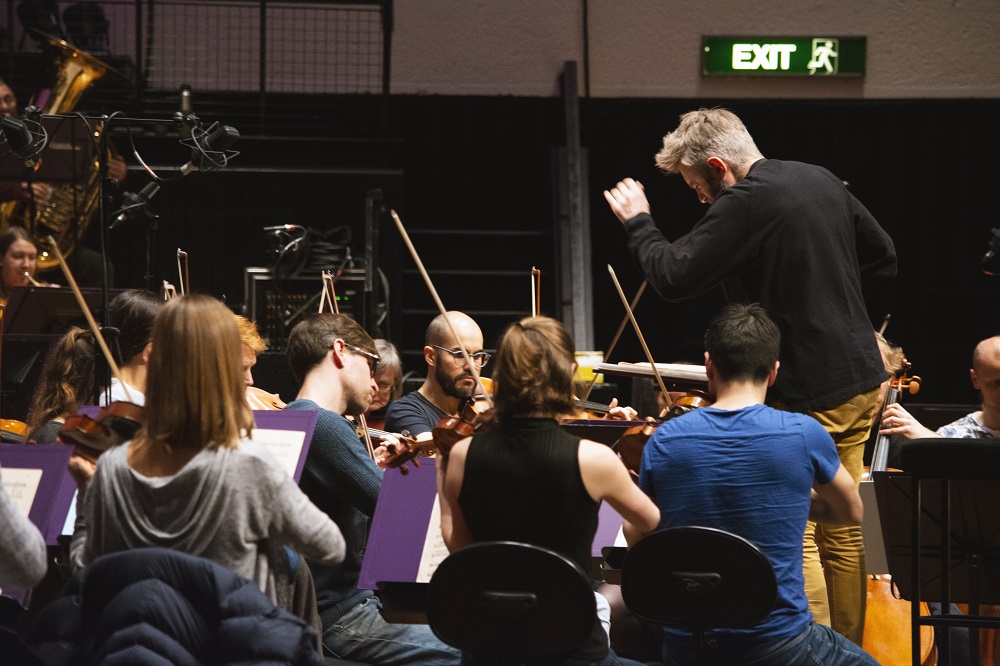Bournemouth SO, Karabits, Lighthouse, Poole review - more voices from the east | reviews, news & interviews
Bournemouth SO, Karabits, Lighthouse, Poole review - more voices from the east
Bournemouth SO, Karabits, Lighthouse, Poole review - more voices from the east
Azeri composers followed by Shostakovich in another adventurous BSO programme

The last of this season’s Bournemouth Symphony Orchestra concert series Voices from the East featured music from Azerbaijan with Kirill Karabits focusing on works by the contemporary composer Franghiz Ali-Zadeh and her teacher Kara Karayev.
Born in Baku in 1918, Karayev spent hard times in Moscow in 1942-46 as a student of Shostakovich before returning to his homeland to become one of its most distinguished composers. Although he died in 1982, he remains renowned there and in the countries of the former Soviet Union for opera, ballet and symphonic works as well as ensemble, instrumental and film music.
Developed from a symphonic suite composed in 1949, his most celebrated work is The Seven Beauties, a full-length ballet from 1952 with a scenario taken from an epic poem by the 12th century Persian poet Ganjavi Nizami involving the tale of a corrupt ruler bewitched by paintings of seven beautiful women from different countries coming to life. Subsequently spurned in love by one of his down-at-heel subjects, he returns to The Beauties seeking atonement and oblivion but finds them ugly and distorted. By the mid-20th century, this might have stirred a queasy cocktail from the legend of Bluebeard shaken with Dorian Gray and a dash of Ruddigore.  Karayev, however, steers a fairy-tale course back towards Rimsky and the Thousand and One Nights, drawing on balletic inspiration from Azerbaijani folk material dressed in his own distinctive Eastern voice with a stylistic nod more towards Khachaturian’s Masquerade than Tchaikovsky or Prokofiev. Karabits (pictured above) persuaded the orchestra to relish the alluring and pungently coloured textures to the full in the three short extracts that opened the concert.
Karayev, however, steers a fairy-tale course back towards Rimsky and the Thousand and One Nights, drawing on balletic inspiration from Azerbaijani folk material dressed in his own distinctive Eastern voice with a stylistic nod more towards Khachaturian’s Masquerade than Tchaikovsky or Prokofiev. Karabits (pictured above) persuaded the orchestra to relish the alluring and pungently coloured textures to the full in the three short extracts that opened the concert.
Cue the world premiere of Franghiz Ali-Zadeh’s new work NIZAMI Cosmology commissioned by Karabits and the BSO. The conductor very helpfully introduced the music from the podium as well as drawing a pertinent line of inheritance from Shostakovich through Karayev to the present-day composer. Nizami has been an inspiration for both Azerbaijani musicians, especially his writings exploring the influence of the sky, comets and the stars upon the development of different peoples on our planet and how they link to Franghiz Ali-Zadeh’s own aspiration to build stylistic musical bridges between Eastern and Western culture (the composer pictured below with Karabits)..
A very large orchestra was deployed within the context of a substantial electronic soundscape designed to evoke the mysteries of the cosmos with a technical operator assisted by the composer herself. The opening of the work evoked a compelling sense of the vastness of space waiting to be filled. Points of contact gradually developed with all the various instruments and sections of the orchestra to build a sequence of teeming climaxes interspersed with plateaus of consolidation to draw breath before going further towards the unanswerable question of “where to…?”.  Almost as a synthesis of late Scriabin tracking through Ives and Varèse to meet Hans Zimmer, the idiom was nurtured by much cinematic wonder and grandeur. The evolving electronic/orchestral relationship was ear-catching in mystery, organic growth and power, but at just over 25 minutes in duration, greater variety of substance and more cohesive development of form with fewer climactic points might have clinched matters with more focus and concision. Nevertheless, the work resounds as a considerable achievement that demands further performance and listening to fully reveal all its secrets.
Almost as a synthesis of late Scriabin tracking through Ives and Varèse to meet Hans Zimmer, the idiom was nurtured by much cinematic wonder and grandeur. The evolving electronic/orchestral relationship was ear-catching in mystery, organic growth and power, but at just over 25 minutes in duration, greater variety of substance and more cohesive development of form with fewer climactic points might have clinched matters with more focus and concision. Nevertheless, the work resounds as a considerable achievement that demands further performance and listening to fully reveal all its secrets.
After the interval and in the light of recent world events, Shostakovich’s Twelfth Symphony brought astute and unexpectedly apposite programming. Composed in 1961 when the composer was under intense pressure to join the Party, the symphony was formally commissioned for the 1961 Communist Party Congress as a commemoration of Lenin and the Russian Revolution of 1917. It has long been viewed as one of his most politically vulnerable and compromised works. But as in his preceding symphony that focused on the 1905 uprising, the composer deftly sidesteps personal portraiture by moving into programmatic guise, deploying a graphic context of site-specific events much in the style of his music for film, which in turn makes notable reference to the cinematic influence on NIZAMI Cosmology.
Although not as ambiguous or subtle in subtext as its predecessor, the Twelfth hardly warrants being passed over in the composer’s symphonic canon as a cop-out to propaganda. Karabits resoundingly redressed its relative neglect with a blazing performance of striking power and vindication. The long-drawn opening celli/bass melody was voiced as an anthem that uncannily registered a genuinely aspirational sense of brotherhood and striving purpose akin to the same lower strings’ annunciation of the Ode to Joy in Beethoven’s Ninth. The ensuing increase of tension and restless propulsion leading to the brazen, brass-laden insistent repetition of the opening bars of the anthem readily assumed a taint of empty rhetoric and the mindless subversion of collective ideals and intent for personal political gain already germinating within the depiction of "Revolutionary Petrograd".
Subsiding without a break into the second movement, "Razliv", the place where Lenin was in hiding awaiting the outcome of events, the music took on a surprisingly valedictory tone. All becomes clear on learning that rather than reflecting the meditative leader-in-waiting, this music originates from one of Shostakovich’s earliest works from childhood – a funeral march for the victims of the revolution inscribed as “Requiem” on his manuscript score. The consolatory and haunting eloquence of Alex Willett's horn solo told all and more.  Thereafter lights, camera and action took over with film-track energy and excitement as the battleship Aurora opens fire to initiate the storming of the Winter Palace leading directly into the last movement – "The Dawn of Humanity". With tub-thumping repetition and multiple fake closing cadences, this ending closes the circle of satirically overstated rhetoric born at the end of the first movement and harks back to the similarly hollow triumph that ends the Fifth Symphony.
Thereafter lights, camera and action took over with film-track energy and excitement as the battleship Aurora opens fire to initiate the storming of the Winter Palace leading directly into the last movement – "The Dawn of Humanity". With tub-thumping repetition and multiple fake closing cadences, this ending closes the circle of satirically overstated rhetoric born at the end of the first movement and harks back to the similarly hollow triumph that ends the Fifth Symphony.
As with Sibelius 2 last month with the BSO, Karabits consistently generates music-making on the cutting edge of spontaneity and collective communication to alert something special. This Shostakovich 12 was enhanced throughout by heart-stopping wind solos from principals Anna Pyne, Edward Kay, Barry Deacon and Tammy Thorn as well as a sonorous elegy from principal trombone, Kevin Morgan. Special mention too for the most tactile tam-tam contribution from Alastair Marshallsay. No all-purpose Top-Rank thwacking here, every varied stroke sensitively resonating or damped to match the tenor of the music to perfection – it really does matter! The symphony glared out from the past as a stark warning of history repeating itself. In current circumstances, it wouldn’t be too difficult to imagine the impassive, wry demeanour of the composer himself had he been present at this comprehensively insightful delivery of one of his problem children 60 years on.
rating
Explore topics
Share this article
Add comment
The future of Arts Journalism
You can stop theartsdesk.com closing!
We urgently need financing to survive. Our fundraising drive has thus far raised £49,000 but we need to reach £100,000 or we will be forced to close. Please contribute here: https://gofund.me/c3f6033d
And if you can forward this information to anyone who might assist, we’d be grateful.

Subscribe to theartsdesk.com
Thank you for continuing to read our work on theartsdesk.com. For unlimited access to every article in its entirety, including our archive of more than 15,000 pieces, we're asking for £5 per month or £40 per year. We feel it's a very good deal, and hope you do too.
To take a subscription now simply click here.
And if you're looking for that extra gift for a friend or family member, why not treat them to a theartsdesk.com gift subscription?
more Classical music
 Bizet in 150th anniversary year: rich and rare French offerings from Palazzetto Bru Zane
Specialists in French romantic music unveil a treasure trove both live and on disc
Bizet in 150th anniversary year: rich and rare French offerings from Palazzetto Bru Zane
Specialists in French romantic music unveil a treasure trove both live and on disc
 Scottish Chamber Orchestra, Ibragimova, Queen’s Hall, Edinburgh review - rarities, novelties and drumrolls
A pity the SCO didn't pick a better showcase for a shining guest artist
Scottish Chamber Orchestra, Ibragimova, Queen’s Hall, Edinburgh review - rarities, novelties and drumrolls
A pity the SCO didn't pick a better showcase for a shining guest artist
 Kilsby, Parkes, Sinfonia of London, Wilson, Barbican review - string things zing and sing in expert hands
British masterpieces for strings plus other-worldly tenor and horn - and a muscular rarity
Kilsby, Parkes, Sinfonia of London, Wilson, Barbican review - string things zing and sing in expert hands
British masterpieces for strings plus other-worldly tenor and horn - and a muscular rarity
 From Historical to Hip-Hop, Classically Black Music Festival, Kings Place review - a cluster of impressive stars for the future
From quasi-Mozartian elegance to the gritty humour of a kitchen inspection
From Historical to Hip-Hop, Classically Black Music Festival, Kings Place review - a cluster of impressive stars for the future
From quasi-Mozartian elegance to the gritty humour of a kitchen inspection
 Shibe, LSO, Adès, Barbican review - gaudy and glorious new music alongside serene Sibelius
Adès’s passion makes persuasive case for the music he loves, both new and old
Shibe, LSO, Adès, Barbican review - gaudy and glorious new music alongside serene Sibelius
Adès’s passion makes persuasive case for the music he loves, both new and old
 Anja Mittermüller, Richard Fu, Wigmore Hall review - a glorious hall debut
The Austrian mezzo shines - at the age of 22
Anja Mittermüller, Richard Fu, Wigmore Hall review - a glorious hall debut
The Austrian mezzo shines - at the age of 22
 First Person: clarinettist Oliver Pashley on the new horizons of The Hermes Experiment's latest album
Compositions by members of this unusual quartet feature for the first time
First Person: clarinettist Oliver Pashley on the new horizons of The Hermes Experiment's latest album
Compositions by members of this unusual quartet feature for the first time
 Gesualdo Passione, Les Arts Florissants, Amala Dior Company, Barbican review - inspired collaboration excavates the music's humanity
At times it was like watching an anarchic religious procession
Gesualdo Passione, Les Arts Florissants, Amala Dior Company, Barbican review - inspired collaboration excavates the music's humanity
At times it was like watching an anarchic religious procession
 Classical CDs: Camels, concrete and cabaret
An influential American composer's 90th birthday box, plus British piano concertos and a father-and-son duo
Classical CDs: Camels, concrete and cabaret
An influential American composer's 90th birthday box, plus British piano concertos and a father-and-son duo
 Cockerham, Manchester Camerata, Sheen, Martin Harris Centre, Manchester review - re-enacting the dawn of modernism
Two UK premieres added to three miniatures from a seminal event of January 1914
Cockerham, Manchester Camerata, Sheen, Martin Harris Centre, Manchester review - re-enacting the dawn of modernism
Two UK premieres added to three miniatures from a seminal event of January 1914
 Kempf, Brno Philharmonic, Davies, Bridgewater Hall, Manchester review - European tradition meets American jazz
Bouncing Czechs enjoy their Gershwin and Brubeck alongside Janáček and Dvořák
Kempf, Brno Philharmonic, Davies, Bridgewater Hall, Manchester review - European tradition meets American jazz
Bouncing Czechs enjoy their Gershwin and Brubeck alongside Janáček and Dvořák
 Solomon, OAE, Butt, QEH review - daft Biblical whitewashing with great choruses
Even a top soprano and mezzo can’t make this Handel paean wholly convincing
Solomon, OAE, Butt, QEH review - daft Biblical whitewashing with great choruses
Even a top soprano and mezzo can’t make this Handel paean wholly convincing

Comments
It was actually Alex Willett
Thanks, Will - I've made the
Thanks, Will - I've made the change on Ian's behalf.